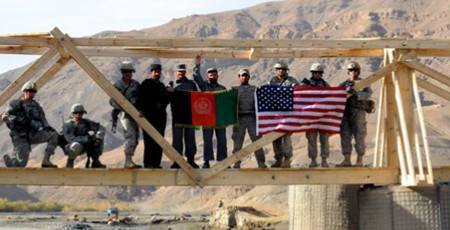By Nicholas K. Mandle
When the score is tight at the end of a baseball game, a team’s manager calls in his closer, a relief pitcher reserved for throwing the final outs. In April, President Barack Obama called in his closer for Afghanistan, Ryan C. Crocker, the former ambassador to post-war Iraq. Before he can climb the mound, however, Crocker needs to be confirmed by Congress, and last week he sat down for a heart-to-heart with the Senate Foreign Relations Committee.

Foreign aid fuels corruption in Afghanistan and short-term projects are of no benefit to the Afghan people. (Photo: http://www.iar-gwu.org/node/315)
The career diplomat began his testimony with the sort of can-do, optimistic language so frequently heard in Washington. “I look forward,” he told the committee, “to renewing our relationship and working together to help the Afghans realize our shared vision for the future of their country, one that is free, secure, democratic, and can stand on its own feet, and plot its own course toward its destiny.” Crocker went on to praise the three “mutually reinforcing surges—military, civilian, and diplomatic”―that have been collaborating to deny Al-Qaeda a safe haven in the country.
This buoyant attitude is meant to be reassuring: we have a plan for Afghanistan and we’re sticking to it. Unfortunately, the plan isn’t working, and Crocker must know it. The Senate sure does.
The day before Crocker testified, the Foreign Relations Committee―the same committee whose blessing Crocker seeks―released a report [PDF] regarding the role of U.S. foreign aid to Afghanistan. It was a stark assessment, finding that the way NGOs and U.S. government organizations spend aid money is potentially doing the country more harm than good. “Foreign aid,” says the report, “when misspent, can fuel corruption, distort labor and goods markets, undermine the host government’s ability to exert control over resources, and contribute to insecurity.” The committee report cites evidence of all of these things occurring in Afghanistan.
Despite thousands of smart, world-wise experts working hard over the past decade to build Afghanistan into a stable state, foreign aid currently accounts for 97 percent of Afghanistan’s GDP, a jaw-dropping statistic. The Senate committee’s report warns that the country could easily slide into economic depression as the United States reduces its footprint over the next few years.
The unsustainable development work in Afghanistan is a major blow to America’s counterinsurgency (COIN) campaign there. Under COIN, the military “clears and holds” hostile territory, which allows the development and diplomatic corps to build infrastructure and provide services for eventual transfer to Afghan authorities. The strategy is predicated on the belief that filling the void in an area once managed by the ousted Taliban makes it more difficult for them to reenter. Trouble is, with foreign nations picking up the tab for construction and management in these contested areas, who takes over when the aid dries up? By investing in short-term projects that produce tangible results—like schools and irrigation systems—aid groups have neglected empowering a weak Afghan government. A great fear is that what the government cannot provide after the U.S. leaves, the Taliban will.
Meanwhile, back home in Congress, getting America out of Afghanistan has become a bipartisan pursuit. Once solely a Democratic cri du coeur, a number of Republicans are now wondering whether the $10-billion-a-month war is wise for a country already deep in debt. Such frustrations were readily apparent at Crocker’s hearing, as Republican and Democratic senators echoed their committee’s aid report: the U.S. effort in Afghanistan, they opined, was not sustainable, lacked a committed partner in the Afghan government, propped up a corrupt system, and had failed to identify realistic metrics for success. And while warning of the consequences of departing the country too rapidly, even Crocker admitted that the U.S. would do well to settle for an Afghan government that is just “good enough.”
The committee’s report notes that good work can still be done in Afghanistan. Aid must be directed toward projects that “build capacity” (a favorite term of the development community) at the highest levels of Afghan government. This means not only fostering accountable governance, but also building a sustainable economy that can keep the government running on its own. After ten years and billions of dollars in aid, Afghanistan is still far from reaching these intuitive goals.
A successful closing pitcher enters the game amid intense pressure, then diffuses it with a win. A seasoned statesman like Crocker might be able to stand up to the pressure, but a winning outcome amid such inefficient fielding remains to be seen.



